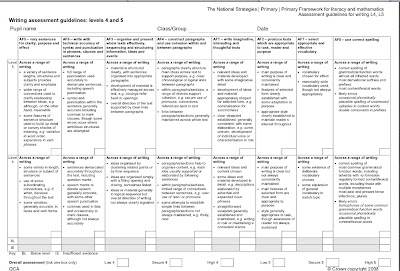The aim of this blog is to allow teachers to develop skills in writing moderation and to add comments/votes to help find accurate writing levels. Hopefully it is a safe and productive place for people to practise levelling children's writing and engaging in discussion.
Using this blog has been the most worthwhile CPD experience I have had in 18 years as a teacher. I especially valued the discussion which took place about Modblog 5
(written by my daughter, Evie) and since then I have felt so much more confident in my own judgements and more at ease with the necessary dialogue and challenge which is central to effective moderation. For their work and contributions I remain grateful for the personalised training given to me by Emma Dawson, Claire Bills, Pete Curtis, James Town, Rebecca Stacey and Ros Wilson. I haven't done too much with Modblog since then because the blog had done it's job, and made me much more confident in this area of my work.
I do hope that teachers are willing to send in samples of writing to me at modblog@hotmail.com to allow visitors to this blog to continue to engage in productive dialogue about children's writing.
The writing sample below was written by Hollie ( year 6) after a visit to Eden Camp Museum in North Yorkshire. Please add your comments/votes.
Criterion Scale: Level 3,4,5 ( reproduced with kind permission from Ros Wilson)
APP Writing Grids: Level 3/4 Level 4/5












.JPG)




